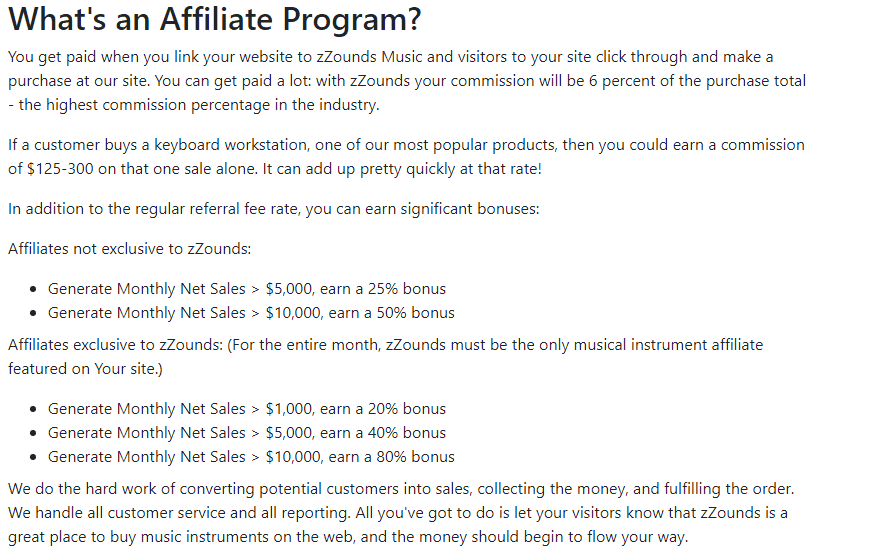Trying to grow your B2C business, but not seeing any results from your paid campaigns? Paid marketing won’t get you as far these days.
People trust reviews and recommendations much more than ads that come directly from a business. Why not partner with individual content creators who have already built this trust?
Affiliate marketing is a great way to harness word-of-mouth recommendations to generate leads and sales. With an affiliate marketing program, you’ll be able to leverage the power of influencers, bloggers, and other content creators to convert more customers. In exchange, you offer affiliates a commission on each sale they help make.
In this article, we define what B2C affiliate programs are, how they can benefit your business, and tips to set up a B2C affiliate program for maximum success.
What is an affiliate program?
In an affiliate program, you partner with select content creators, such as bloggers, social media personalities, and other influencers, to promote your products within their content. This partnership extends your market reach, and serves as an endorsement from someone who is trusted by their audience.
How does this work? Your affiliates place a unique link to your site within their content. Usually, affiliates will also review your product, which encourages more of their audience to click on the links. Then, when someone clicks on the affiliate link and purchases your product, the affiliate earns a cash commission on the sale.
Benefits of a B2C affiliate program
With the majority of advertisers turning to affiliate marketing, these programs are becoming one of the primary drivers in the B2C industry. In fact, 81.4% of affiliates promote B2C products or services.
Here are some the reasons why affiliate marketing is the perfect match for B2C businesses:
- Affiliate marketing allows your brand to reach a larger, well-targeted audience.
- Affiliates provide you with authentic insights about what they like about your product.
- A content creator’s audience trusts their opinion, which makes them more likely to check out any recommended products.
- Affiliate programs are low-risk. Because you only pay affiliates when a sale is made, you never have to worry about a negative ROI.
- Affiliate management, sales tracking, and commission payouts can be automated with easy-to-use affiliate software.
- Affiliate marketing brings more potential customers into the funnel, increasing your site’s traffic, leads, and conversion rates.
All of these factors add up to an affiliate program that’s much more effective for your B2C business than using a paid ad strategy and hoping for the best.
Should you start a B2C affiliate program?
Just because affiliate marketing works well for B2C ecommerce sites doesn’t mean any business can jump right in without preparation.
Before implementing an affiliate program, your business should meet the following requirements:
- You must be willing and able to pay consistent commissions. Every affiliate sale needs to be compensated in cash and according to a timely schedule.
- You must have a firm idea of how high you can set commission rates and still turn profits. This is best determined by your average profit margins.
- It helps to already know a few content creators whose audience matches your brand’s target audience. Bonus points for potential affiliates who are already happy users of your product or service.
- Your product or service should appeal to a wide audience.
Pro tip: Don’t feel ready for an affiliate program? Consider starting with a referral program.
Referral programs leverage the recommendations of your existing customers.
You still offer rewards when customers personally share your brand with their family and friends. But you have more reward flexibility – you can give non-cash incentives, such as store credit, discounts, free products, and branded swag.
If you’re a B2C ecommerce business, check out our dedicated guide to ecommerce referral programs.
Best practices for your B2C affiliate program
If your B2C business meets the above requirements and you’re ready to create your own affiliate program, it’s a good idea to start with some proven affiliate marketing best practices.
Following these tips will help increase the success of your affiliate marketing strategy.
Set goals for your program
Tracking progress is an important part of any business endeavor.
When setting goals for your affiliate program, it’s best to use the SMART goals method: specific, measurable, attainable, relevant, and time-bound goals. Some examples of SMART affiliate program goals are:
- How much revenue do you expect your B2C affiliate partners to bring in over a given period of time?
- How many new customers or new sales do you want the program to bring in during a specific time frame?
- What is your ideal conversion rate for the program per quarter or per year?
- What average order value would you like to see driven by your affiliate partners per quarter or per year?
Investigate the competition’s affiliate programs
One of the best ways to get an idea of how to structure your own affiliate marketing program is to look at what your competitors are doing.
- Find at least two competitors who have affiliate programs.
- Take a look at what their affiliate commission rates are, how they structure their commissions, how long their affiliate tracking cookies last, and their other terms and conditions.
- If possible, learn more about how they implement their program.
- How are they finding affiliates to join the program?
- What methods do they use to train and communicate with affiliates?
- Once you’ve gathered as much as you can, run a SWOT analysis for each competitor’s affiliate program. Compare strengths, weaknesses, opportunities you could take advantage of, and threats they could pose to your program.
With this information, you’re equipped to craft a program of your own that’s attractive enough to form the best affiliate partnerships and hold its own against the competition.
Use affiliate software to set up your program
Once your program starts gaining traction, you don’t want to manage everything by hand. There are two options for setting up your affiliate program: affiliate networks and affiliate software.
Affiliate networks help you run an affiliate program, but they come at a cost to your business. Networks are expensive. They take an additional cut of your sales – on top of the commission you’re paying affiliates – and often charge other extra fees.
Since networks essentially act as a middleman, they own any affiliate relationships and program data. In most cases, affiliate networks also impose rules and restrictions to run your program on their platform.
In our opinion, using affiliate software makes the most sense.
Affiliate software is an out-of-the-box solution that tracks affiliate leads and sales, instantly sends payouts to affiliate partners, and automates other routine tasks.
With affiliate software, you pay once, and you own your own program, affiliate relationships, and data. In addition, you have the freedom to customize the program using your own preferred specifications.
Choose the right commission
A motivating commission rate is key in attracting high-quality partnerships. When determining your affiliate commission rates and commission structure in your partner program, keep these tips in mind:
- To attract the most affiliates, payouts should be in cash. A suitable cash equivalent, such as PayPal or Visa gift cards, is also acceptable.
- Commissions can be either a flat fee or a set percentage of each sale. Flat fees may be easier to manage for your budget, but percentages are great for rewarding higher order values if you sell a variety of products.
- To ensure a positive ROI, commissions should only be paid when a sale is made (not for traffic or leads).
- Your rates should be competitive with what other programs in your industry are offering.
- Set a rate you know you can pay out consistently.
Create an affiliate agreement
When an affiliate is accepted into your program, it’s important to have them sign an affiliate agreement.
This agreement ensures everyone is aware of the terms and expectations of the program.
A properly written affiliate marketing agreement will also have clear rules to protect your brand from fraudulent or unethical activity. These rules should extend to what affiliates can and can’t say about your brand, and include any guidelines about how you want your brand presented.
Your agreement should also be a resource affiliates can refer to when they need clarity on how the program works. Here are some points your affiliate agreement should cover:
- What are the commission rates?
- When are affiliates eligible to earn commissions on referrals (i.e., instantly after a sale, 30 days after)?
- How long are tracking cookies valid after they’re clicked? (In other words, how long is an affiliate able to earn a commission after a link is clicked?)
- When and how are payouts made?
- If a product is returned or service is canceled, do affiliates lose the opportunity to earn a commission on the sale?
Find the right affiliates
Like any form of digital marketing, affiliate marketing relies on having a targeted audience. The best affiliates are content creators who have the same target audience as you.
Searching social media can be a good way to find influencers with a similar audience to your own.
You could also use brand mention tools or software that lets you know who talks about your brand online (including when and how often they talk about you).
It can also be helpful to add an open application for your affiliate program to your website. This way, people who have shown interest in your brand can learn about the opportunity to expand their connection with you.
Pro tip: When looking for creators, it’s important to pay attention to the size of their audience, but not in the way you might think.
The trust someone’s built up among an audience is far more important than their number of followers.
Larger creators are more likely to ask for significantly higher commissions than smaller creators.
Larger creators will naturally pull in a much larger audience. But smaller creators tend to have a closer-knit audience and higher level of engagement from their audience, which may often point to a higher level of trust.
Learn more about how to find the best affiliates in our dedicated guide.
Choose the best affiliates who meet your needs
Whether you find affiliates on your own, or let them sign up through your website, you still need to screen each applicant to ensure that they are a good fit for your program.
The following list of criteria will give you an idea of what to look for in an affiliate:
- They should have a similar audience to your brand’s target audience.
- They should create new content on a consistent basis.
- They should have a high level of trust and engagement from their audience. High engagement means they’re more likely to have an audience who will listen to them.
- Their personality, style, and tone should match with how you want to present your brand.
- They should behave ethically. Spammy or unethical behavior will reflect poorly on your company.
Communicate well with affiliates
We’ve already covered how your affiliate agreement should outline what affiliates can and can’t say about your brand.
But it isn’t enough to put this information in an agreement. Important details like this should be part of the affiliate onboarding process.
During onboarding, you should let affiliates know where to access graphics, videos, templates, and other assets that can be used to better promote your brand.
As new developments and updates occur in the program, ensure each of your affiliates is informed.
An email list can be an effective way to reach all of your affiliates at once. You could also set up a dedicated social media group, Slack group, or forum just for affiliates.
And always provide affiliates a way to reach you if they have questions or concerns.
Keep affiliates motivated with program variety
When your program stagnates, affiliates will lose interest. A good affiliate marketing program will change things up every so often to keep affiliates interested.
- Time-sensitive offers, such as coupon codes they can give out to their audience for greater discounts are one way to shake things up.
- You can also offer permanently increased commission rates when their lifetime sales reach a certain point.
- You can offer a brief period of higher commission rates to motivate your affiliates to put some extra effort in during a slow sales cycle.
- Competition is also a great motivator. Extra incentives and rewards for the top performers will create a healthy competition that should drive more engaged affiliates.
Track affiliate sales
The increased lead generation of an affiliate program comes with the responsibility of tracking the sales your affiliates bring in. Accurate tracking is important because it ensures all affiliates receive their earned commissions, and you can clearly see the progress of your program.
As we’ve mentioned, affiliate software will track affiliate sales for you and automate much of the process. The software will also collect valuable marketing analytics, and allow you to integrate with other tools in your current stack.
Like all good marketing campaigns, affiliate programs benefit from regular reviews to gain insight into how your program works.
B2C affiliate program examples
Now that you know the basics of starting a B2C affiliate program, let’s look at some of the largest B2C affiliate programs to see how they attract a large and dedicated base of partners.
Madison Reed
Madison Reed, a hair color company, does a good job of keeping affiliates in the loop and making it easy to promote their products.
An affiliate-only newsletter keeps creators updated with all they need to know. They even get the privilege of sharing product sneak peeks with their audience.
Plus, affiliates benefit from reliable commission rates and a relatively long window to earn them (30 days after someone clicks their affiliate link).

ZZounds
ZZounds, a company that sells musical instruments and equipment, offers affiliates a competitive commission. But it goes beyond that to equip affiliates and keep them engaged.
Advocates have access to tools that aid with social media marketing, email marketing, and search engine marketing.
ZZounds affiliates are given frequent promotions, including commission bonuses as monthly sales increase, and added bonuses when they promote zZounds exclusively without linking to competitors. Plus, detailed data is made available to affiliates so they can monitor their progress and make improvements as needed.

Fanatical
Game key website Fanatical is very clear about who makes a suitable affiliate: enthusiastic gamers with websites, YouTube channels, or Twitch channels dedicated to gaming.
The brand offers a large selection of products, which is immediately attractive to affiliates. The variety allows them to frequently promote the company without getting too repetitive. They also offer a high commission, which further incentivizes affiliates to stay engaged.
We particularly love the video Fanatical uses to promote their program to potential affiliates, and quickly give them the lowdown on what to expect from the program.

Nordstrom
Nordstrom offers a little bit of everything to their affiliates. Good tracking tools, a wide variety of products to promote, competitive commission rates, a wealth of creative materials, and promotional offers and events to maintain interest all serve to help them attract and retain high performing affiliates.
Plus, affiliates gain regular access to tips and updates from the Nordstrom team, in the form of a regular newsletter. The success of their program shows how much weight having a well-rounded affiliate program carries.
Conclusion
With the right tools and the right partners, B2C affiliate programs can be a lucrative way to grow your company.
It may take a lot of hard work and planning to get an affiliate marketing program off the ground, but tools such as Referral Rock make the hardest parts easy. To see just how easy it can be, sign up for a free demo today.




